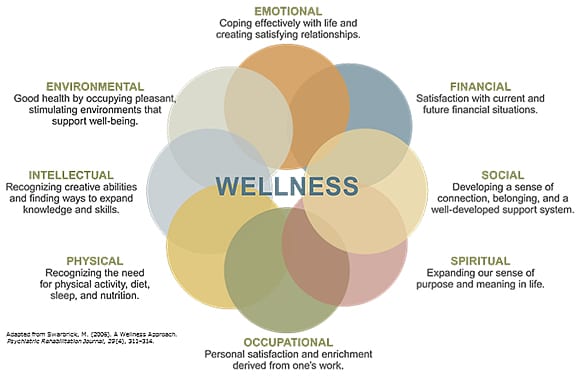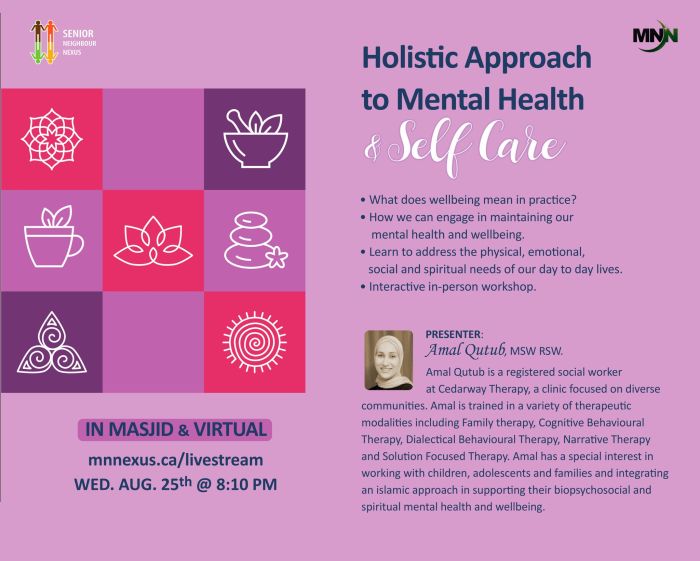
Gracepoint Wellness: A Holistic Approach to Mental Health sets the stage for this enthralling narrative, offering readers a glimpse into a story that is rich in detail and brimming with originality from the outset.
As we delve deeper into the concept of holistic mental health care, we uncover a world where physical, mental, and emotional well-being intertwine to create a comprehensive approach to healing.
Introduction to Gracepoint Wellness
Gracepoint Wellness takes a holistic approach to mental health, recognizing that well-being is not just about the mind but also the body and emotions. By integrating physical, mental, and emotional aspects, Gracepoint Wellness aims to provide comprehensive care for individuals seeking support.
Integration of Physical, Mental, and Emotional Well-being
Gracepoint Wellness understands that mental health is interconnected with physical and emotional well-being. By addressing all aspects of a person's health, including exercise, nutrition, therapy, and emotional support, individuals can experience a more balanced and sustainable approach to mental wellness.
Importance of Holistic Approaches in Mental Health Care
Holistic approaches in mental health care are crucial as they acknowledge the complexity of human well-being. By looking at the whole person rather than just isolated symptoms, holistic care can address underlying issues, promote overall health, and improve the quality of life for individuals struggling with mental health challenges.
Services Offered by Gracepoint Wellness
Gracepoint Wellness offers a variety of services aimed at promoting mental health and well-being through a holistic approach. These services are designed to address the physical, emotional, and spiritual aspects of individuals to achieve overall wellness.
Counseling and Therapy
- Individual Therapy: One-on-one sessions with a therapist to address personal challenges, explore emotions, and develop coping strategies.
- Group Therapy: Therapy sessions conducted in a group setting to provide support, insight, and connection with others facing similar issues.
- Family Therapy: Therapy sessions involving family members to improve communication, resolve conflicts, and strengthen relationships.
Mindfulness and Meditation
- Mindfulness Practices: Techniques to increase self-awareness, reduce stress, and promote mental clarity.
- Meditation Sessions: Guided meditation sessions to cultivate inner peace, focus, and emotional balance.
Yoga and Movement Therapy
- Yoga Classes: Physical practice integrating breathwork, movement, and mindfulness to enhance physical and mental well-being.
- Movement Therapy: Therapeutic approach using movement and body awareness to improve emotional regulation and release tension.
Art and Expressive Therapies
- Art Therapy: Creative process using art materials to explore emotions, reduce anxiety, and enhance self-expression.
- Music Therapy: Therapeutic use of music to promote relaxation, emotional healing, and self-discovery.
The Role of Nutrition in Mental Health

Nutrition plays a crucial role in supporting mental health by providing the essential nutrients needed for optimal brain function and overall well-being. The food we eat directly impacts our mood, energy levels, cognitive function, and emotional stability.Gracepoint Wellness incorporates nutrition into their holistic approach by recognizing the connection between what we eat and how we feel.
They offer personalized nutrition plans tailored to each individual's needs, aiming to optimize mental health outcomes through a balanced diet
.
Impact of Diet on Mental Well-being
- Poor nutrition can lead to deficiencies in essential vitamins and minerals, affecting neurotransmitter function and mood regulation.
- A diet high in processed foods, sugar, and unhealthy fats has been linked to an increased risk of depression, anxiety, and other mental health disorders.
- In contrast, a diet rich in fruits, vegetables, whole grains, lean proteins, and healthy fats can support brain health, improve mood, and reduce symptoms of mental illness.
Mindfulness and Meditation Practices
Mindfulness and meditation play a crucial role in promoting mental health and overall well-being. These practices help individuals cultivate a sense of awareness, presence, and inner peace, which can significantly reduce stress, anxiety, and depression.
Benefits of Mindfulness and Meditation
- Reduced stress and anxiety levels
- Improved focus and concentration
- Enhanced self-awareness and emotional regulation
- Promotion of relaxation and better sleep quality
- Increased resilience and overall sense of well-being
Gracepoint Wellness Incorporation of Mindfulness
Gracepoint Wellness integrates mindfulness techniques such as deep breathing exercises, body scans, and guided meditation into their treatment plans.
Therapists at Gracepoint Wellness work with clients to develop mindfulness practices that can be easily incorporated into their daily routines. By encouraging clients to stay present in the moment and observe their thoughts and emotions without judgment, mindfulness becomes a powerful tool in managing mental health challenges.
Techniques for Mindfulness and Meditation
- Deep Breathing Exercises: Focus on your breath, inhaling deeply through your nose and exhaling slowly through your mouth.
- Body Scan Meditation: Bring awareness to each part of your body, starting from your toes and moving up to your head, releasing tension along the way.
- Loving-Kindness Meditation: Cultivate feelings of love and compassion towards yourself and others through positive affirmations and well wishes.
- Mindful Walking: Pay attention to each step you take, the sensation of your feet touching the ground, and the sounds around you.
Exercise and Physical Activity
Regular physical activity plays a crucial role in maintaining good mental health. Exercise has been shown to reduce symptoms of anxiety and depression, improve mood, boost self-esteem, and enhance cognitive function.
Importance of Exercise for Mental Health
Exercise helps to reduce stress levels by releasing endorphins, also known as the "feel-good" hormones. It promotes better sleep patterns, increases energy levels, and provides a sense of accomplishment, all of which contribute to improved mental well-being.
- Engaging in physical activity can help alleviate symptoms of anxiety and depression.
- Regular exercise can enhance cognitive function and improve focus and concentration.
- Physical activity promotes the release of neurotransmitters like serotonin, dopamine, and norepinephrine, which are essential for mood regulation.
Encouraging Exercise at Gracepoint Wellness
At Gracepoint Wellness, we encourage our clients to incorporate exercise into their holistic approach to mental health. Our experienced therapists work with individuals to create personalized exercise plans tailored to their needs and preferences. Whether it's through yoga, walking, running, dancing, or strength training, we emphasize the importance of staying active for overall well-being.
Suitable Physical Activities for Mental Well-being
- Yoga: Combining physical postures, breathing techniques, and mindfulness, yoga can help reduce stress, improve flexibility, and promote relaxation.
- Walking or Jogging: Simple yet effective, walking or jogging outdoors can boost mood, increase energy levels, and provide a sense of calm.
- Dancing: Dancing is a fun way to get moving, release pent-up emotions, and improve coordination, all of which contribute to better mental health.
- Strength Training: Building muscle strength through weightlifting or resistance exercises can boost self-confidence, enhance body image, and reduce symptoms of anxiety and depression.
Outcome Summary

In conclusion, Gracepoint Wellness: A Holistic Approach to Mental Health emerges as a beacon of hope in the realm of mental health care, showcasing the power of an integrated approach that nurtures the mind, body, and soul.
FAQ Corner
How does Gracepoint Wellness define a holistic approach to mental health?
Gracepoint Wellness views a holistic approach as one that considers the interconnectedness of physical, mental, and emotional well-being in promoting overall mental wellness.
What are some examples of treatment modalities used by Gracepoint Wellness?
Gracepoint Wellness utilizes a range of modalities such as cognitive-behavioral therapy, mindfulness practices, and art therapy to address mental health concerns.
How does Gracepoint Wellness incorporate nutrition into their holistic approach?
Gracepoint Wellness emphasizes the importance of nutrition in mental health by offering dietary guidance and personalized nutrition plans to support overall well-being.
What role does exercise play in the holistic approach at Gracepoint Wellness?
Exercise is encouraged as a vital component of mental health care at Gracepoint Wellness, with tailored physical activities recommended to enhance well-being.
 Gracepoint Wellness: A Holistic Approach to Mental Health sets the stage for this enthralling narrative, offering readers a glimpse into a story that is rich in detail and brimming with originality from the outset.
As we delve deeper into the concept of holistic mental health care, we uncover a world where physical, mental, and emotional well-being intertwine to create a comprehensive approach to healing.
Gracepoint Wellness: A Holistic Approach to Mental Health sets the stage for this enthralling narrative, offering readers a glimpse into a story that is rich in detail and brimming with originality from the outset.
As we delve deeper into the concept of holistic mental health care, we uncover a world where physical, mental, and emotional well-being intertwine to create a comprehensive approach to healing.
 Nutrition plays a crucial role in supporting mental health by providing the essential nutrients needed for optimal brain function and overall well-being. The food we eat directly impacts our mood, energy levels, cognitive function, and emotional stability.Gracepoint Wellness incorporates nutrition into their holistic approach by recognizing the connection between what we eat and how we feel.
They offer personalized nutrition plans tailored to each individual's needs, aiming to optimize mental health outcomes through a balanced diet
Nutrition plays a crucial role in supporting mental health by providing the essential nutrients needed for optimal brain function and overall well-being. The food we eat directly impacts our mood, energy levels, cognitive function, and emotional stability.Gracepoint Wellness incorporates nutrition into their holistic approach by recognizing the connection between what we eat and how we feel.
They offer personalized nutrition plans tailored to each individual's needs, aiming to optimize mental health outcomes through a balanced diet In conclusion, Gracepoint Wellness: A Holistic Approach to Mental Health emerges as a beacon of hope in the realm of mental health care, showcasing the power of an integrated approach that nurtures the mind, body, and soul.
In conclusion, Gracepoint Wellness: A Holistic Approach to Mental Health emerges as a beacon of hope in the realm of mental health care, showcasing the power of an integrated approach that nurtures the mind, body, and soul.












